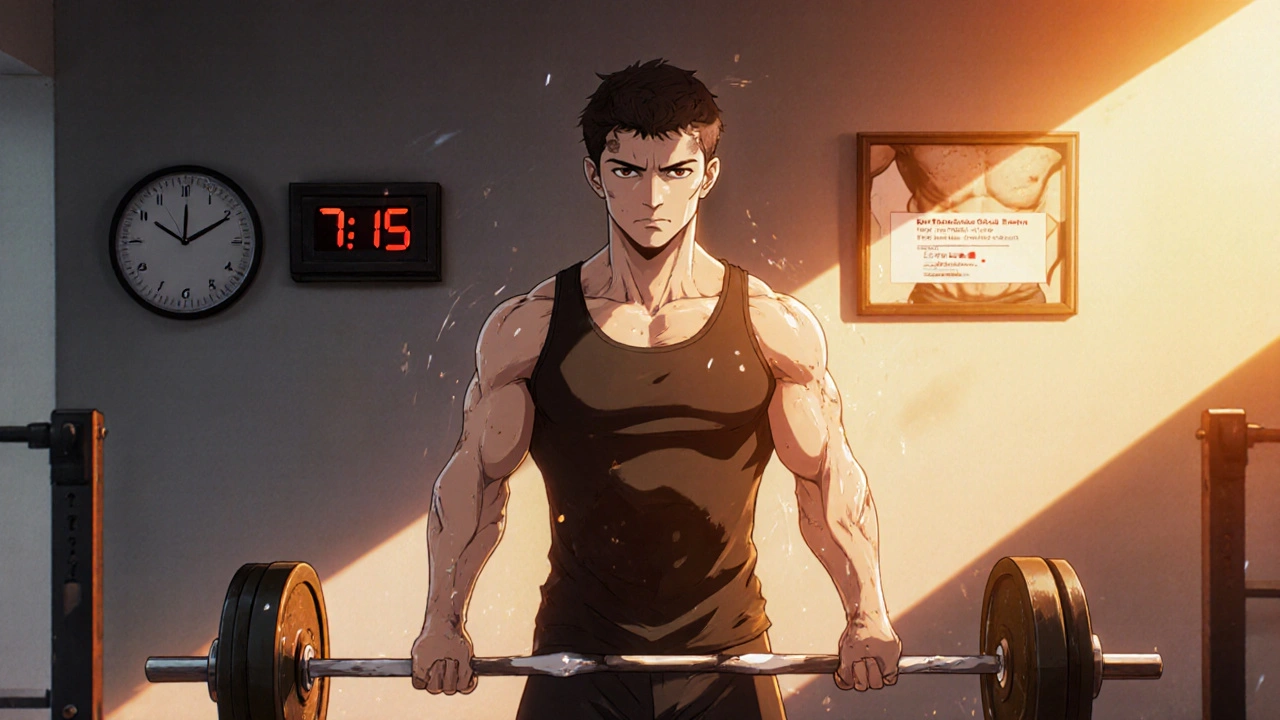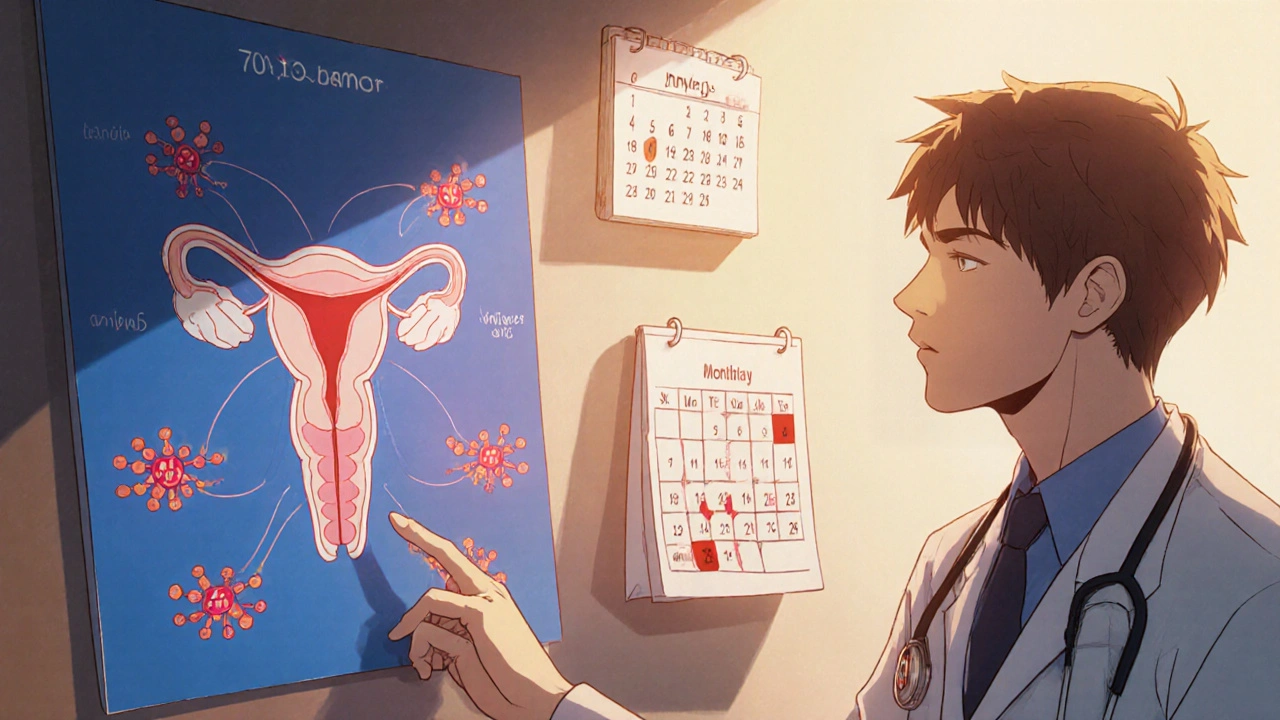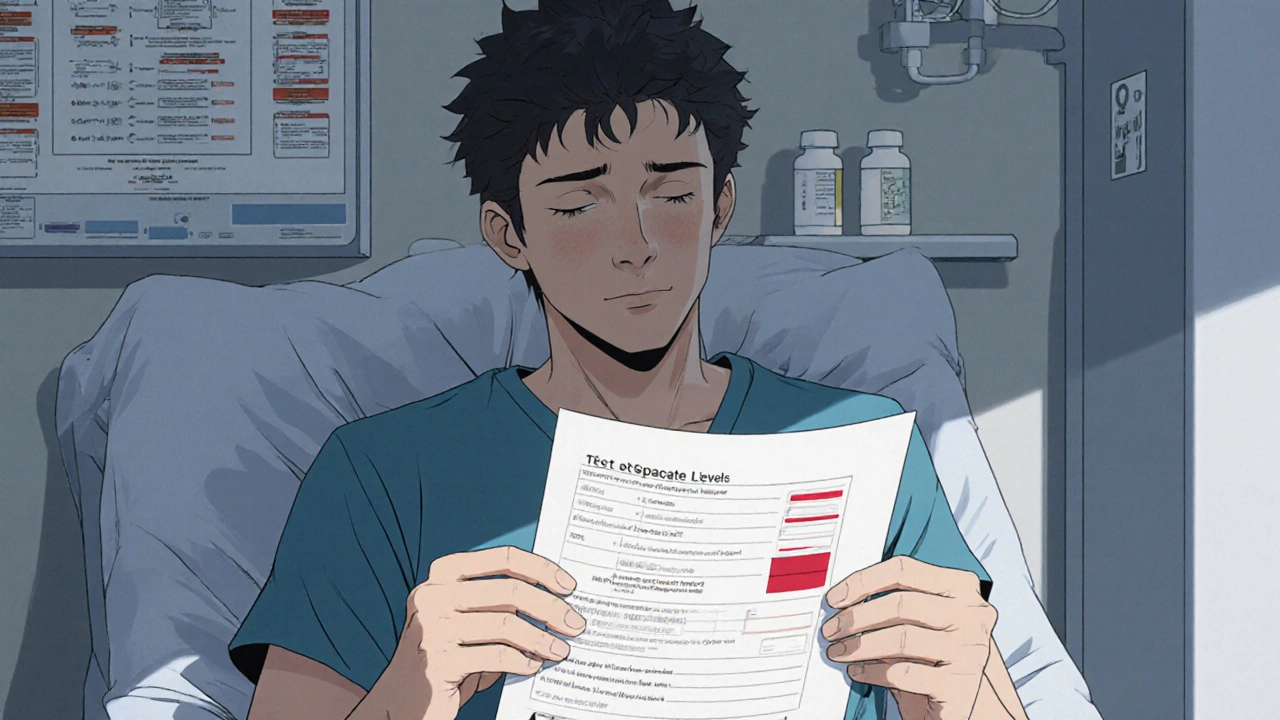Opioid-Related Testosterone Assessment Tool
This assessment tool is based on the ADAM (Androgen Deficiency in Aging Males) questionnaire. If you're taking opioids for more than 3 months, this can help identify potential symptoms of opioid-induced low testosterone (OPIAD). Answer the following 10 questions honestly. This is not a medical diagnosis, but can help determine if you should discuss further testing with your doctor.
When you're taking opioids for chronic pain, you might expect side effects like drowsiness, constipation, or nausea. But one serious, often overlooked effect is low testosterone. This isn't just about feeling tired-it can mess with your sex life, muscle strength, mood, and even your heart health. If you've been on opioids for more than a few months and notice changes in how you feel, it's not all in your head. It could be opioid-induced androgen deficiency, or OPIAD-a real, measurable hormone problem backed by science.
How Opioids Lower Testosterone
Opioids don't just block pain signals-they also interfere with your body's hormone system. Specifically, they hit the hypothalamic-pituitary-gonadal (HPG) axis, the control center for testosterone production. When you take opioids regularly, especially long-acting ones like methadone or buprenorphine, they reduce the pulses of GnRH (gonadotropin-releasing hormone) from your brain. That tells your pituitary gland to stop making LH (luteinizing hormone), which is the signal your testes need to produce testosterone.
It's not a quick drop. Most men don't notice symptoms until after 3 to 6 months of daily use. Studies show that men on long-term opioids have testosterone levels about half of what's normal. In one study of over 800 opioid users, average testosterone was just 245 ng/dL-way below the normal range of 300-1000 ng/dL. Methadone users had even lower levels than those on buprenorphine, suggesting the type and duration of opioid matter.
What Low Testosterone Feels Like on Opioids
If you're on opioids and feeling off, here's what to watch for:
- Low libido: Nearly 7 out of 10 men report a major drop in sex drive.
- Erectile dysfunction: Happens in 60-75% of cases-not always from anxiety or nerve damage, but from hormone imbalance.
- Chronic fatigue: You're not just tired-you're drained. Studies show fatigue scores are 2.5 times higher than normal.
- Mood changes: Irritability, depression, and brain fog are common. One study found 40% higher depression symptoms in opioid users with low testosterone.
- Body changes: You might lose muscle, gain belly fat, or feel weaker lifting things you used to handle easily.
- Bone weakness: Testosterone helps keep bones dense. Opioid users show 15-20% lower bone density in the spine, raising fracture risk.
- Anemia: Hemoglobin levels often drop to 12.3 g/dL (normal is 14-18), making you feel breathless and pale.
These symptoms don't always show up together. Some men notice only one or two. But if you're on long-term opioids and feel like you're aging faster than you should, OPIAD could be why.
Testing for Low Testosterone
You can't guess this. You need a blood test. But timing matters. Testosterone peaks in the morning, so get tested between 7 and 10 a.m. Your doctor should check both total and free testosterone. One low reading isn't enough-two low results, taken weeks apart, are needed to confirm diagnosis.
Doctors often use the ADAM questionnaire (Androgen Deficiency in Aging Males) as a quick screen. If you answer "yes" to three or more of these questions:
- Do you have a decreased sex drive?
- Do you lack energy?
- Do you have decreased strength and/or endurance?
- Have you lost height?
- Have you noticed a decreased enjoyment of life?
- Are you sad or grumpy?
- Are your erections less strong?
- Have you noticed a recent deterioration in your ability to play sports?
- Do you fall asleep after dinner?
- Has there been a recent deterioration in your work performance?
Then lab testing is strongly recommended. Many primary care doctors don't screen for this-so if you're concerned, ask.

Treatment: Testosterone Replacement Therapy (TRT)
If your levels are low and symptoms match, TRT can help. It's not a quick fix, but it's backed by solid evidence. Multiple studies show it improves sexual function, mood, muscle mass, and even survival rates.
Options include:
- Injections: Testosterone cypionate or enanthate, 100-200 mg every 1-2 weeks. Fast-acting and cost-effective.
- Gels: Applied daily to skin (50-100 mg). Easy to use, but you must avoid skin-to-skin contact until dry.
- Patches: Worn daily on skin. Can cause irritation in some men.
- Buccal tablets: Placed between gum and cheek twice daily. Less common but avoids skin contact.
In a 6-month trial, men on TRT saw their erectile function scores jump from 12.5 to 19.8 (out of 30). They gained 3.2 kg of lean muscle and lost 2.1 kg of fat. They also reported less pain sensitivity-something opioids alone couldn't fix.
And the benefits go beyond quality of life. One major study found that opioid users on TRT had:
- 49% lower risk of dying from any cause
- 42% lower risk of heart attack or stroke
- 35% lower risk of hip or femur fractures
- 26% lower risk of anemia
That’s not just feeling better-it’s living longer.
Risks and Warnings
TRT isn't risk-free. The FDA requires black box warnings for testosterone products due to potential cardiovascular risks. Side effects include:
- Polycythemia: Thickened blood from too many red cells. Happens in 15-20% of users. Can lead to clots or stroke.
- Lower HDL (good cholesterol): Drops by 10-15 mg/dL on average.
- Acne: Especially with gels and patches.
- Prostate concerns: TRT isn't safe if you have prostate cancer or high PSA. Men over 50 need PSA checks every 6 months.
- Testosterone shuts down natural production: Once you start, your body may stop making its own. Stopping suddenly can cause a crash.
TRT is also contraindicated if you have breast cancer or are at high risk for it. Always discuss your full medical history with your doctor.

Non-Drug Ways to Support Testosterone
Even if you're on TRT, lifestyle changes help. They won't fix OPIAD alone, but they make treatment safer and more effective:
- Stay at a healthy weight: BMI under 25 is linked to 20-30% higher testosterone.
- Do resistance training: Three strength sessions a week can boost testosterone by 15-25%.
- Sleep 7-9 hours: Poor sleep cuts testosterone by up to 20%.
- Avoid smoking: Smokers have 15-20% lower levels.
- Limit alcohol: More than 14 drinks a week can drop testosterone by 25%.
- Control blood sugar: Diabetics have 25-35% lower testosterone. Avoiding sugar helps.
These aren't just "good habits." For men on opioids, they're part of the treatment plan.
What Your Doctor Might Not Tell You
Some health systems, like the VA, warn that testosterone therapy is being pushed by drug companies. They're right to be cautious. But dismissing OPIAD entirely ignores real data. The problem isn't TRT-it's the lack of screening. Millions of men are on opioids long-term, and most have never had their testosterone checked.
Doctors need to ask. Patients need to speak up. If you're on opioids for more than 90 days and feel off, don't assume it's just the pain or aging. Ask for a testosterone test. If your doctor says no, ask why. If they say it's "just a phase," push back. This is a treatable medical condition, not a normal side effect.
What Comes Next?
OPIAD is still underdiagnosed. We don't yet have perfect long-term safety data for TRT in opioid users. But the evidence so far is strong: untreated low testosterone harms your body. Treated properly, it can restore function-and even save lives.
If you're on long-term opioids, get tested. If your levels are low, talk about TRT. Combine it with lifestyle changes. Monitor your blood work. Don't wait until you're exhausted, depressed, or injured to act. Your hormones are working against you-and you have the power to fix it.
Can opioids cause low testosterone even if I'm not addicted?
Yes. Opioid-induced low testosterone (OPIAD) happens because of how the drugs affect your hormone system-not because of addiction. Even people taking opioids as prescribed for chronic pain can develop this condition after 3-6 months of daily use. It's a pharmacological side effect, not a behavioral one.
Is testosterone replacement safe for men on methadone?
Yes, but it requires careful monitoring. Men on methadone often have the lowest testosterone levels, making TRT especially beneficial. However, because methadone can affect heart rhythm and liver function, doctors need to check for heart issues and liver enzymes before starting. Regular blood tests for hematocrit, PSA, and lipid levels are essential.
Will testosterone therapy interfere with my pain control?
No-it may actually help. Studies show men on TRT report improved pain tolerance and reduced hyperalgesia (increased sensitivity to pain). Low testosterone makes your nervous system more sensitive to pain. Restoring hormone levels can reduce this effect, meaning you might need less opioid over time.
How long does it take to feel better after starting testosterone therapy?
Most men notice improved energy and mood within 2-4 weeks. Sexual function and muscle strength usually improve after 6-12 weeks. Full benefits-like improved bone density and body composition-take 6 months or longer. Patience and consistency matter.
Can women on opioids also have low testosterone?
Yes. While women produce less testosterone than men, it still plays a key role in energy, libido, and mood. Opioids can suppress it too. Some studies suggest DHEA supplementation may help, but evidence is limited. Women should discuss symptoms like fatigue, low sex drive, or depression with their doctor and request hormone testing.
Should I stop opioids to fix low testosterone?
Not necessarily. For many, opioids are essential for pain control. Stopping them abruptly can be dangerous. The goal isn't to eliminate opioids-it's to treat the hormone side effect. TRT can be safely used alongside opioids. If you're considering reducing opioids, work with a pain specialist to taper safely.



14 Comments
Arpit Sinojia
October 29, 2025 AT 18:59Man, this is wild. I never thought opioids could mess with your hormones like this. I’ve been on them for pain since 2020 and just assumed I was getting older. Turns out I’m just low on testosterone. Gonna ask my doc for a test next week.
Kshitiz Dhakal
October 30, 2025 AT 20:41TRT is just pharmaceutical capitalism repackaging male decline as a medical problem. The body isn't broken-it's adapting. You're trading one dependency for another. The real issue? We've normalized chemical suppression of natural function.
kris tanev
October 31, 2025 AT 14:54OMG YES THIS. I was so tired all the time and thought it was just stress. Got tested last year after reading this exact thing online-my T was at 210. Started gels. Within 3 weeks I had energy again. Like I’d been running on 10% battery for years. Also sex life improved?? Shocking. Doctors need to screen for this. No one tells you.
Mer Amour
November 2, 2025 AT 00:03Of course testosterone replacement is dangerous. It’s not a vitamin. You’re artificially manipulating a system designed to self-regulate. The fact that people are so eager to inject chemicals instead of fixing lifestyle is why America is falling apart. Sleep. Lift weights. Stop eating sugar. Done.
Cosmas Opurum
November 2, 2025 AT 14:40This is a Western scam. In Nigeria we don't have this problem. We take painkillers and still work in the fields. You people are too soft. Also why are you trusting Big Pharma to fix what your laziness broke? Testosterone therapy? More like testosterone capitalism.
peter richardson
November 3, 2025 AT 22:40My doctor said my levels were fine but I felt like crap anyway. So I got a second opinion. Turned out my free T was half of what it should’ve been. They ignored the numbers because I didn’t fit the "classic" profile. Don’t let them dismiss you. Push back.
Uttam Patel
November 5, 2025 AT 21:16So you’re telling me my 3am snacks and Netflix binges are why I can’t get it up? Thanks for the diagnosis, doc.
Kirk Elifson
November 7, 2025 AT 16:20TRT is the new vape. Everyone’s doing it because they think it makes them a man again. But you’re not a man because of your T levels. You’re a man because of your choices. Stop outsourcing your vitality to a pharmacy. Go outside. Lift something heavy. Feel the sun. That’s what your body wants.
Nolan Kiser
November 8, 2025 AT 07:39Just want to clarify something real quick: Polycythemia from TRT is manageable with regular phlebotomy. It’s not a dealbreaker. And yes, HDL drops-but LDL and triglycerides often improve too. The key is monitoring. If your doc isn’t checking hematocrit every 3 months, find a new one. This isn’t rocket science, but it’s not a free pass either.
Dylan Kane
November 10, 2025 AT 02:44Typical. Another article that makes men feel broken so they’ll pay for a pill. You know what fixes low testosterone? Not taking opioids. Why not just admit the drug is the problem instead of patching it with hormones?
Shanice Alethia
November 10, 2025 AT 17:23THIS IS A CRISES. I’M SO ANGRY. WHY IS NO ONE TALKING ABOUT THIS?! My husband has been on oxycodone for 2 years and he’s a shell of himself. He cries over commercials. He can’t lift the groceries. He doesn’t even kiss me anymore. I cried reading this. We’re getting tested tomorrow. I’m telling everyone.
Sam Tyler
November 11, 2025 AT 07:43For anyone considering TRT, please understand this isn’t a magic bullet. It’s a tool that works best when paired with real lifestyle changes. Sleep, resistance training, stress management, and diet all amplify the benefits and reduce side effects. I’ve helped over 20 patients on long-term opioids start TRT-those who did the lifestyle work saw double the improvement. Don’t just take the shot. Show up for your body.
Ellen Frida
November 11, 2025 AT 18:57i read this and i was like wait… i thought i was just depressed… but i also havent had sex in 8 months and my biceps are gone… and i fell asleep on my couch yesterday holding a spoon… is this real??
shridhar shanbhag
November 12, 2025 AT 23:55From India: We have a word for this-"dil kharab"-heart broken. But it’s not just the heart. It’s the whole system. I’ve seen this in my clinic. Men on opioids, silent, tired, withdrawn. We start TRT, and slowly they come back. Not because of the hormone-but because they feel like themselves again. Don’t wait until you’re broken to ask for help.